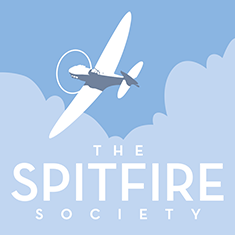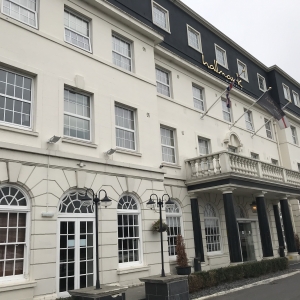
Spitfire Fund beer and film festival - 2 March 2019
Welcome to the launch of The Spitfire Fund (click here for further details) and our inaugural beer and film festival at the Amy Johnson Suite within the Croydon Aerodrome Hotel on Saturday 2 March 2019. The venue is centrally located by car and public transport, please see the map below. The closest rail station is Waddon with West Croydon, East Croydon and South Croydon stations slightly further away and buses stop outside at Croydon Airport House. The Hotel offers free parking, refreshments, accommodation and situated next to the historic Croydon Airport terminal. The event will start at 10am and finish at 11pm and further details about the Hotel and booking a room can be found by clicking here.
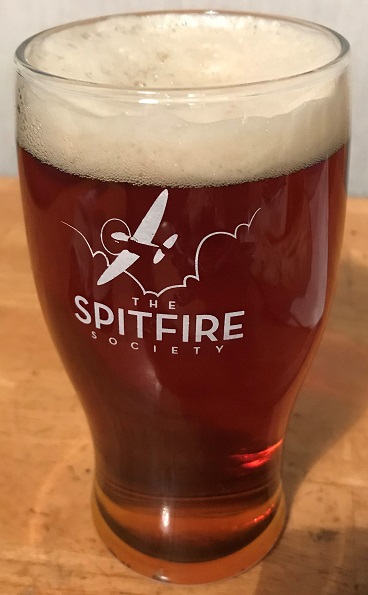
Tickets
Tickets can be purchased in advance or on the door but there is limited number of spaces and we would recommend booking ahead of the event. Tickets are available for the whole day or for individual screenings and members of The Spitfire Society get a discount. If for any reason the event doesn't go ahead or a film can't be shown a full refund will be given to the ticket holder as appropriate.
All Day Tickets Receive The Following:
- Complimentary Society pint glass and three pints of beer from the available selection, see section below.
- All screenings throughout the day for no additional charge.
- Free snacks supplied in the Amy Johnson Suite.
- Supporters badge
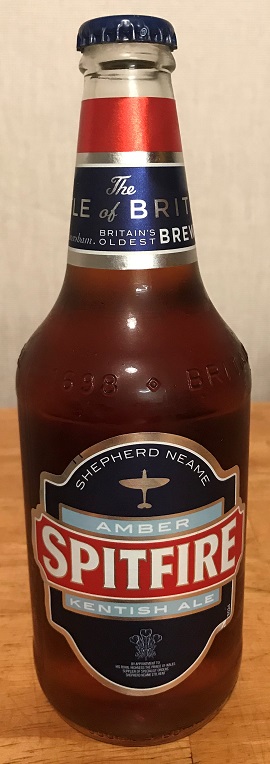
Beers
The range of beers will include the essential Spitfire by Shepherd Neame and the following beers from Marstons: Ringwood Razorback Amber Ale; Lancaster Bomber Amber Ale; Brakspear Bitter; Marston's Pedigree Amber Ale; Jennings Cumberland Ale and Hobgoblin Ruby Beer.
If you wish to purchase more beers after the three pints included within the all day ticket, you can at a price of £3 a pint.
Spitfire
Taste: Spicy, Hoppy, Bitter.
Ringwood Razorback Amber Ale
Taste: With an ideal balance of hoppiness and malt, this easy drinking thirst quencher is the perfect beer for all occasions.
Lancaster Bomber Amber Ale
Taste: A classic English ale, chestnut in colour with a lovely full-bodied flavour, enriched with a wonderful late hop character.
Brakspear Bitter
Taste: Amber in colour, the initial taste of malt and well hopped bitterness dissolves into a bittersweet and fruity finish.
Marston's Pedigree Amber Ale
Taste: Bottle conditioned so closer to cask Pedigree. Fascinating aroma, with a palate of biscuity malt, spicy hops & fruitiness.
Jennings Cumberland Ale
Taste: A supreme and refreshing golden ale with unique character and slight citrus after taste.
Hobgoblin Ruby Beer
Taste: A full bodied, ruby beer with chocolate and toffee malt flavours balanced by a bitter and overall fruity, mischievous character.
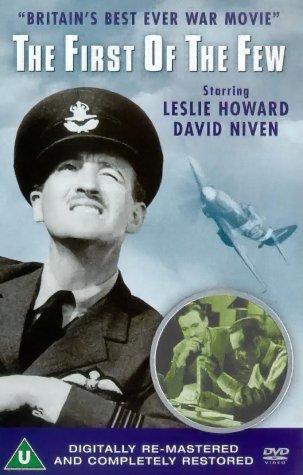
10am - First of the Few (1942) - Universal
A newsreel sets the scene for summer 1940, showing Nazi advances in Europe with Britain facing invasion and aerial attacks on the island increasing. On 15 September 1940, during the Battle of Britain, RAF Squadron Leader Geoffrey Crisp (David Niven), the station commander of a Spitfire squadron, recounts the story of how his friend, R. J. Mitchell (Leslie Howard) designed the Spitfire fighter. His pilots listen as Crisp begins with the 1922 Schneider Trophy competition, where Mitchell began his most important work, designing high speed aircraft. While watching seagulls with his binoculars, he envisages a new shape for aircraft in the future. Crisp, an ex-First World War pilot seeking work, captivates Mitchell with his enthusiasm and the designer promises to hire him as test pilot should his design ever go into production. Facing opposition from official sources, Mitchell succeeds in creating a series of highly successful seaplane racers, eventually winning the Schneider Trophy outright for Great Britain.
After a visit to Germany in the 1930s and a chance meeting with leading German aircraft designer Willy Messerschmitt and after hearing talk of German Re-Armament Mitchell resolves to build the fastest and deadliest fighter aircraft. Convincing Henry Royce of Rolls-Royce that a new engine, eventually to become the famous Rolls-Royce Merlin, is needed, Mitchell gets the powerplant he requires. Faced by the devastating news that he has only one year to live and battling against failing health, Mitchell dies as the first prototype Supermarine Spitfire takes to the skies. Crisp ends his account when the squadron is scrambled to counter a German attack: the fight sees the Germans beaten, with the Luftwaffe losing more planes than the British. In the end, Crisp is happy over the victory and looks to the heavens to Mitchell, voicing a thanks to Mitchell for creating the Spitfire.
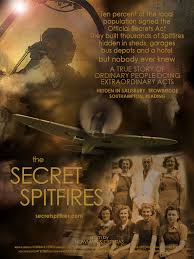
2pm - The Secret Spitfires (2018) - PG
In 1940, the Germans destroyed the Spitfire factories in Southampton and believed they had ended the threat from their nemesis. But unknown to them, the British were building Spitfires in secret. Salisbury, a small market town in the south of England become a major centre for manufacturing Spitfires, hidden in sheds, garages, back gardens, a bus depot and a hotel. With a workforce mainly made up of unskilled young girls, boys, women and a handful of engineers, over 2000 Spitfires were built, 10% of the total build, becoming instrumental in winning the war.
Witnesses tell the story of this amazing achievement, recounting times of terrible sadness as well as joyous times that included GI dances, a Glenn Miller concert and a Joe Louis boxing match. Set against a backdrop of picturesque English countryside, we talk to 90 year old veterans who as teenagers built the aircraft in their local villages and towns, and we hear from modern-day fighter pilots for whom the Spitfire holds a special place in history. This incredible story concludes with Dame Vera Lynn reciting a moving poem written by a Spitfire pilot.
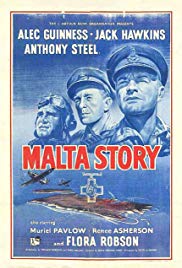
3.30pm - Malta Story (1953) - Universal
In 1942 Britain is trying hard to hold on to Malta while invasion seems imminent; Italians and Germans are regularly bombing the airfields and towns. The RAF fight to survive against the odds using the few fighter aircraft remaining on the island. Flight Lieutenant Peter Ross (Alec Guinness), an archaeologist in civilian life, is on his way to an RAF posting in Egypt but is stranded in Malta due to the air attacks. He is assigned to the RAF squadron there, being an experienced photo reconnaissance pilot.
Peter meets Maria (Muriel Pavlow), a young Maltese woman working in the RAF operations room. The two fall in love and spend a few romantic hours in the Neolithic temples of Mnajdra and Ħaġar Qim on the island. In the meantime the situation at Malta becomes desperate. Every day civilians are buried under the rubble of air attacks, and famine threatens their survival, as relief convoys are easy prey to the numerous bombings. The island relies on the last few ships of a convoy for supplies.
Peter proposes marriage to Maria, although they realise that wartime is not favourable to lasting love affairs, as Maria's mother suggests; nevertheless, the young couple remain hopeful of the future. Giuseppe, Maria's brother (Nigel Stock) is arrested while trying to infiltrate the island from Italy, where he had been studying since before the war. He admits to being on a spying mission, which he tries to justify by saying he wants to save Malta from further destruction. Maria's mother lives a double family drama knowing that one of her children will almost certainly be executed, and the other is in a doomed love affair.
The RAF holds on, and, along with Royal Navy submarines, is eventually able to take the offensive, targeting enemy shipping on its way to Rommel in Libya. Many air raids take place either to defend the island with Spitfires or a number of attack aircraft, including Bristol Beaufighter fighter-bombers, Bristol Beaufort and Fairey Swordfish torpedo bombers, which succeed in sinking Italian tankers and warships. There comes the moment when the most important enemy convoy is on its way to Libya under cover of poor visibility.
Peter's commanding officer (Jack Hawkins) needs desperately to locate this target and orders him to find it at any cost, realising that this will be virtually a suicide mission. Peter, flying in his Spitfire, finally finds it, but has to stay close to keep contact. He is attacked by six Messerschmitt Bf 109Fs. Peter stays calm, but cannot escape his fate; he is shot down and killed, while Maria in the operations room listens helplessly to his final radio transmissions.
Later the next day, Maria sits by the beach, thinking of her beloved Peter. In the end, a newspaper article notes that the attack was a success, as the Afrika Corps has lost the Second Battle of El Alamein (in part due to supply shortages) and thus their foothold in Africa.
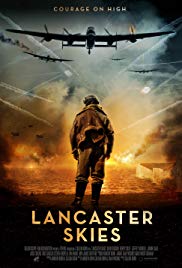
5.30pm - Lancaster Skies (2019) - PG
‘Lancaster Skies’ is a loving homage to the classic British war films of the 1940’s and 50’s. The production team set about the creative process with those gems from the past firmly in mind. With the total budget for the film set at only £80k, the small production team knew that the visual element of the film was going to prove very challenging indeed. In keeping with the retrospective look and feel of the film scale models were used for the majority of the visual effects. Digital effects were deliberately kept to a bare minimum. The result is a film set during the Second World War with the power to make an audience feel that they have been transported back to the art deco picture houses of the past.
Douglas Miller, a broken, solitary, Spitfire ace, who survived the Battle of Britain, transfers to Bomber Command, determined to take the war to the skies over Nazi Germany. Douglas must take the place of a Lancaster Bomber crew's cherished and respected skipper, who was killed in action. With the crew against him, he must gain their trust and overcome his past to become the leader they so desperately need.
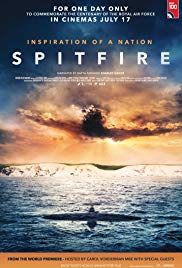
7.30pm - Spitfire: Inspiration of a Nation (2018) - PG
SPITFIRE is a cinematic, epic, sweeping tale of determination, vision and courage. It is the story of an aeroplane that was forged in competition, shaped as the war clouds gathered and refined in the white heat of combat – going on to become the most famous fighter aircraft ever made.
Credited with changing the course of world history, this is the Spitfire’s story – told personally in the words of the last-surviving combat veterans. Through their recollections, we experience the terror and exhilaration of combat five miles up, the sudden loss of friends and the grim determination to see the job through.
Breath-taking aerial footage from the world’s top aviation photographer John Dibbs is combined with rare digitally re-mastered archive film from the tumultuous days of the 1940s, when the Spitfire’s power in the skies was unrivalled. A beautiful original score from composer Chris Roe, and the roar of the famous Merlin engine, creates an incredible soundscape to make this a striking and poignant film.
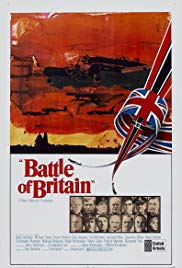
9.30pm - Battle of Britain (1969) - Universal
During the Battle of France in June 1940, RAF pilots evacuate a small airfield in advance of the German Blitzkrieg. The pilots, along with British and French military, leave just as German aircraft arrive and execute a heavy strafing attack. RAF Air Chief Marshal Hugh Dowding (Laurence Olivier), realising that an imminent invasion of Great Britain will require every available aircraft and airman to counter it, stops additional aircraft being deployed to France so that they are available to defend Britain. In the next dramatic scene, French civilians watch in grim despair as a convoy of German troops marches into France and takes control.
At the deserted beaches of Dunkirk, the BBC reports British Prime Minister Winston Churchill's declaration that "what General Weygand called the 'Battle of France' is over, the Battle of Britain is about to begin". Luftwaffe Inspector-General Field Marshal Milch arrives to inspect a large German airfield in captured France. Hundreds of Heinkel bomber aircraft are stationed under Luftwaffe General Kesselring's command.
Luftwaffe commanders are stunned when the Führer informs them that the British are not their "natural enemy" and delays their attack while attempting a diplomatic settlement. In neutral Switzerland, the German ambassador, Baron von Richter (Curd Jürgens) officially proposes new peace terms to his British counterpart, Sir David Kelly (Ralph Richardson), stating that continuing to fight the "masters" of Europe is hopeless. Kelly's brave retort, "Don't threaten or dictate to us until you're marching up Whitehall ... and even then we won't listen", is followed by a private comment to his wife that von Richter is probably correct. In England, commanders celebrate their good fortune, using the delay to build up their strength and continually train their pilots and ground controllers.
The wait finally ends when Luftwaffe pilots receive orders to move to the front, where troops are preparing for a sea-borne invasion. The campaign begins with the Luftwaffe launching an early morning assault on "Eagle Day". The plan is to destroy the RAF on the ground before they have time to launch their Spitfire and Hurricane fighters.
Eagle Day proves highly successful, with attacks on British radar installations by Stuka dive bombers. Two radar stations are put out of action and a number of British airfields are damaged or destroyed but British losses are relatively light. A grueling battle of attrition ensues, with the RAF airfields under repeated attack while inflicting heavy, but non-critical, damage on the attacking forces.
Adding to the RAF's problems is a battle between the commanding officers of 11 Group, Keith Park (Trevor Howard), and 12 Group, Trafford Leigh-Mallory (Patrick Wymark). 12 Group is tasked with protecting 11 Group's airfields while 11 Group meets the enemy, but in raid after raid 12 Group aircraft are nowhere to be seen. Called to meet Dowding, Leigh-Mallory explains that the "Big Wing" tactic takes time for form up, while Park complains that the tactic simply is not working. Dowding ends the debate noting a critical shortage of pilots, wearily remarking, "We're fighting for survival, and losing."
The turning point occurs when a squadron of German bombers becomes lost in bad weather at night and drops bombs on London. In retaliation, the RAF attacks Berlin. Though the damage is negligible, an enraged Adolf Hitler publicly orders London to be razed. Hermann Göring (Hein Riess) arrives in France to personally command the attack, confident that the end of the battle nears. Their first attack skirts the RAF, who are still defending their airfields to the south, and they bomb unopposed. Night time attacks follow and London burns.
Meanwhile, to supplement Commonwealth forces, the RAF has been forming units of foreign pilots who have escaped German-occupied countries; the main difficulty is their lack of English-language skills. While on a training flight, a Free Polish squadron accidentally runs into an unescorted flight of German bombers. Ignoring the commands of their British training officer, they peel off one by one and shoot down several of the bombers with unorthodox aggressive tactics. Park rewards them by elevating them to operational status, leading Dowding to do the same for the Canadian and Czech squadrons as well.
While discussing the day's events, Park and Dowding examine the German switch to London. Given a respite, Park notes that he will be able to repair his airfields and bring his squadrons back to full strength. Dowding adds that 12 Group units north of London are now all within range, while enemy fighters are at the extreme edge of their own range. He concludes that "turning on London could be the German's biggest blunder."
The next German daytime raid is met by a massive response; watching his formations build up in 11 Group's operations room, Wing Commander Willoughby (Robert Flemyng) wryly states "this should give them something to think about." RAF fighters arranged into large groups, attack en masse, overwhelming the German raids. Luftwaffe losses are now critical and Göring is incensed, ordering his fighters remain with the bombers, an order the pilots hate. Losses continue to mount on both sides.
The climactic air battle of 15 September 1940 arrives, with Winston Churchill in attendance at 11 Group's operations room. In the underground bunker, British ground control personnel order every squadron into the air to meet the massive attack. Intense combat in the sky over London follows, with both sides taking heavy losses. The outcome is so confused that Dowding refuses to comment on the events.
The next day the RAF anxiously await a raid that never comes. Likewise the Luftwaffe is disheartened by heavy losses and also await orders that never come to resume raiding. Two German anti-aircraft gunners, who had earlier observed a French port teeming with Kriegsmarine vessels and landing barges, now observe a deserted harbour basin. Göring leaves the front, accusing his commanders of betrayal. Dowding looks out over the gardens and up to the sky where the words of Winston Churchill appear onscreen: "Never in the field of human conflict was so much owed by so many to so few."

